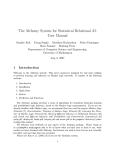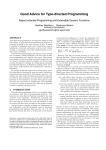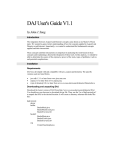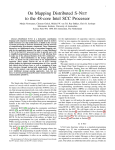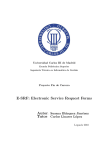Download adbc documentation
Transcript
adbc - Design by Contract for AspectJ
User manual - version 0.3
Adbc is a small and lightweight library that adds support for design by contract to the AspectJ programming
language. The library essentially consists of a number of aspects that monitor your contracts at runtime
and will throw an exception whenever a contract is broken.
1
Requirements
• Java 6 (or later)
• AspectJ (tested on versions 1.6.12 and 1.7.2)
2
Installation
Include adbc.jar on the build path of your AspectJ project and contract enforcement should be enabled
automatically. If you’re using Eclipse+AJDT, this is done as follows:
1. Right-click your AspectJ project and go to “Properties”.
2. Go to “AspectJ Build”, “InPath”.
3. Click the “Add (External) JARs...” button and select the adbc.jar file.
(If an exception is thrown, check the Troubleshooting section.)
4. Close the Properties window with the OK button. You can now start writing contracts using the
annotations available in the be.ac.ua.ansymo.adbc.annotations package.
Note that, because the aspects of adbc can advise any method call and advice execution, you probably
want to hide AJDT’s advice markers for those aspects. You can do this by right-clicking your AspectJ
project, then go to “AspectJ Tools”, “Configure advice markers...”. Finally set the icon for all aspects in
the be.ac.ua.ansymo.adbc package to None.
If you’d like to tinker with adbc on a small toy project before enabling it on your own projects, have a look
at the included example in the adbc/source/src/be/ac/ua/ansymo/example_bank folder.
1
3
Usage
Contracts in adbc are specified using Java annotations. Adbc makes use of the following annotations:
Specifies the preconditions of a method, a constructor or an advice. This annotation takes one
or more strings as its value, where each string is a contract specified as a boolean expression1 .
@requires
@ensures
Specifies the postconditions of a method, a constructor or an advice.
@invariant
Specifies the invariants of a class or an aspect.
Specifies that a method expects to be advised by the listed advice, in the given order. This
annotation can only be attached to methods, and has one or more strings as its value. Each string
should contain the canonical/absolute name of an advice. Note that an @advisedBy annotation on a
method is implicitly inherited by any overriding methods in subclasses.
@advisedBy
If an advice is mentioned in an @advisedBy annotation, and its pointcut contains
constructs that can only be determined at runtime (e.g. if, cflow), you should attach this annotation
to the advice and copy these runtime tests into the annotation’s value. (This information is redundant,
but adbc currently makes use of this annotation because all pointcut-related information is lost after
weaving.)
@pointcutRuntimeTest
This annotation is part of AspectJ itself, and is used to give a name to an advice. An advice
is required to have a name if you want to mention it in an @advisedBy annotation.
@AdviceName
When writing contracts, the following variables and functions are available:
The this object.
$this
parameters
$result
The parameters of methods and advice can be simply accessed using their name.
The return value of a method/advice, available only in postconditions.
The $old function can only be used in postconditions. It evaluates an expression before the
method/advice is executed, stores the result, and makes it available in postconditions. This is useful
if, for example, you want to compare the old value of a field with its new value.
$old(expr)
When used in a precondition of an overriding method, $super refers to the preconditions of the
overridden method. Likewise, when used in the postcondition, $super refers to the postconditions of
the overridden method. Used in an invariant, it refers to the invariants of the super class.
$super
$proc
This variable can only be used in the pre- or postconditions of around advice. When used in a
precondition, $proc refers to the preconditions of the body that you know will be executed next when
making a proceed call. The emphasis on know indicates that you should only be aware of any advice
that have been mentioned explicitly in an @advisedBy annotation of the advised method. Likewise,
when $proc is used in a postcondition, it refers to the postconditions of the body that you know will
be executed next when making a proceed call.
1 By
default, contracts are written as JavaScript expressions. However, it is also possible to use another language by setting
to another scripting engine that implements the JSR-223 API.
AdbcConfig.engine
2
With contract enforcement enabled, contracts are checked at runtime, guided by behavioural subtyping and
the advice substitution principle. (See the Modular reasoning section for more information.) Whenever a
contract is broken, a ContractEnforcementException is thrown, indicating which part of the contract was
broken, and who is to blame.
4
Modular reasoning
Modular reasoning is mainly concerned with the ability to reason about a method call by only taking into
account the contracts of the receiver’s static type (rather than having to take into account every potential
dynamic type). In practical terms, it should be sufficient to inspect the tooltip you get when hovering over
a method call in Eclipse. (In particular, that tooltip also includes the method body’s contracts, since its
annotations are displayed.) These contracts should be sufficient to reason about the method call, in the
sense that you can rely on them to be the minimum requirements and guarantees that will actually hold at
runtime.
However, modular reasoning is not something that you get for free. Modular reasoning is not automatically
guaranteed by Java, and certainly not by AspectJ. In Java, a method call might behave differently from
what you expect. The method body being executed at runtime (in the dynamic type) could be different
from the method body that you expected (in the static type). Java by itself does not prevent you from
implementing completely different behaviour in an overriding method, compared to the behaviour of the
overridden method.
To obtain modular reasoning in Java, there are some “behavioural subtyping” rules you need to take into
account when implementing a class:
• The preconditions of methods should be equal to or weaker than those in the supertype.
• The postconditions of methods should be equal to or stronger than those in the supertype.
(However, this constraint only applies if the preconditions of the supertype held in the pre-state. If
they did not hold, you know that the static type cannot be the supertype or any other ancestor, so
you can’t “surprise” the caller even if the postconditions are weaker than the supertype.)
• Invariants of the supertype must be preserved.
If a class is unable to comply with these rules, you can always write a wrapper class around whichever class
you’d like to extend instead. (.. although you do lose the benefit of being able to substitute for that class.)
Modular reasoning in AspectJ presents some additional complexity: Not only can the dynamic type differ
from the static type at a method call, but an advice could also completely change the behaviour of that
method call. Luckily, there is a very similar set of rules for writing advice, called the advice substitution
principle (ASP). Note that the “contracts of an advised join point” refers to the contracts of the method
body in the static type2 of an advised method call.
• The preconditions of the advice should be equal to or weaker than those of the join points it advises.
• The postconditions of the advice should be equal to or stronger than those of the join points it
advises. (Again, this constraint only applies if the preconditions of the advised join point held in the
pre-state.)
2 This
applies to advice that match on execution join points too, as they also modify the behaviour of method calls.
3
• Invariants of the advised join points must be preserved.
The above rules apply to around advice. Since the contracts of before/after advice do not include the
effects of their implicit proceed call, there are some small differences in their ASP rules. In case of before
advice, the ASP becomes:
• The preconditions of the advice should be equal to or weaker than those of the join points it advises.
• If the preconditions of the advised join points held before executing the advice, they should still hold
at the end of the advice.
• Invariants of the advised join points must be preserved.
In case of after advice:
• The preconditions of the advice should be equal to or weaker than the postconditions of the advised
join point.
• If the postconditions of the advised join point held before executing the advice, they should still hold
at the end of the advice.
• Invariants of the advised join points must be preserved.
In case an advice is unable to comply with the ASP (e.g. an authentication aspect), this means the advice
cannot help but create surprising behaviour that was not expected by the caller of an advised method. To
avoid such surprises, we should make the caller aware of the advice somehow. This is done in adbc by
means of the @advisedBy annotation. If an advice is not ASP-compliant, it should add its name to an
@advisedBy annotation in the relevant method bodies: The idea here is that, whenever a method call is
made that might be advised by a non-ASP-compliant advice, that advice’s name3 should appear in the
@advisedBy clause of the method being called (based on the receiver’s static type). That is, in case the
advice makes use of a call pointcut, the advice’s name should be mentioned in an @advisedBy annotation
in the method(s) specified in the call construct. (Note that the @advisedBy annotation is automatically
inherited by subclasses.) In case of an execution pointcut, the advice’s name should be mentioned in the
class that first declares the method specified in the execution construct.
In summary, adbc’s approach to modular reasoning consists of the following rules:
• When implementing classes, try to take into account the behavioural subtyping rules. If this is not
possible, write a wrapper class instead.
• When implementing advice, try to take into account the rules of the ASP.
• If an advice cannot comply with the ASP (or if you wish to become explicitly aware of the advice), the
advice’s name should be mentioned in an @advisedBy annotation such that anyone making a method
call that might be advised by this advice, is effectively aware of it.
– If multiple non-ASP-compliant advice are advising the same join point, they should be executed in
the order specified by the @advisedBy annotation of the join point. When making a proceed call,
a non-ASP-compliant advice must also be aware of the advice that follow it in the @advisedBy
annotation.
3 An
advice can be given a name by attaching an @AdviceName annotation.
4
– If ASP-compliant and non-ASP-compliant advice are advising the same join point, the non-ASPcompliant advice get higher precedence. (This is because ASP-compliant advice do not have to
take into account the contracts of other advice.)
5
Examples
Writing contracts for classes
The following example of a simple Square class demonstrates the basic syntax of contracts:
@invariant("$this.getWidth()==$this.getHeight()")
class Square {
@requires("s > 0"})
@ensures({"$this.getHeight()==s", "$this.getWidth()==s"})
public void setSize(int s) {...}
@ensures("$result==$this.getWidth()*$this.getWidth()")
public int getArea() {...}
@ensures({"$this.getX()==$old($this.getX())+x",
"$this.getY()==$old($this.getY())+y")
public void move(int x, int y) {...}
...
}
Note that a contract can consist of multiple parts. For example, the postcondition of setSize() consists of
parts $this.getHeight()==s and $this.getWidth()==s. This is equivalent to $this.getHeight()==s &&
$this.getWidth()==s. The benefit of writing a contract in multiple parts is that, if a contract is broken,
we can pinpoint more precisely which part was broken.
Writing contracts for ASP-compliant aspects
The following is an example of a simple caching advice. Its preconditions are the same as those of the
join point it advises. The postconditions are slightly stronger, due to the addition of isCached(i,val).
Consequently, the advice satisfies the advice substitution principle.
aspect ListCache {
@requires("$proc"})
@ensures("$proc && isCached(i,val)")
void around(int i, Object val):
call(void List.set(int, Object)) && args(i, val) {
...
}
...
}
5
Writing contracts for advice isn’t all that different from writing contracts for methods. What is mainly
interesting here is the use of the $proc keyword. In the precondition, it refers to the preconditions of
List.set(). Note that the pointcut could potentially also match on an overridden version of List.set().
If this is the case, the advice should technically also take into account the preconditions of overridden
versions, as calls to those methods are advised as well. Likewise, the $proc keyword in the postcondition
refers to the postconditions of List.set() (or an overridden version).
Writing contracts for non-ASP-compliant aspects
The following is an example of an authentication advice that does not satisfy the advice substitution
principle. This is because the postcondition evaluates to true whenever the user is not logged in, which
clearly is weaker than the postcondition of Account.transfer().
public aspect Authentication {
@requires("$proc")
@ensures({"from.getOwner().isLoggedIn()?$proc:true"})
@AdviceName("authenticate")
void around(Account from, double amount, Account to):
call(void Account.transfer(double, Account))
&& args(amount, to) && target(from) {
if (from.getOwner().isLoggedIn()) {
proceed(from, amount, to);
}
}
...
}
Because this advice does not satisfy the advice substitution principle, it could cause surprises for anyone
calling Account.transfer(). More specifically, if the user is not logged in, nothing will happen. If this
outcome is not specified in Account.transfer(), “nothing” isn’t exactly what we expected to happen when
calling transfer.
However, we can restore modular reasoning by adding an @advisedBy annotation to the join point shadows
of the authentication advice. In this case, we’ll add the annotation to the Account.transfer() method:
public class Account{
@requires({"amount>0", "to!=null"})
@ensures({"$this.getAmount()==$old($this.getAmount())-amount",
"to.getAmount()==$old(to.getAmount())+amount"})
@advisedBy({"com.bankapp.aspects.Authentication.authenticate"
,"com.bankapp.aspects.Authorization.authorize"})
public void transfer(double amount, Account to) {...}
...
}
In this example, the @advisedBy annotation in Account.transfer() mentions two advice: authenticate and
(Note that any advice in an @advisedBy annotation must have a name, i.e. an @AdviceName
annotation.) Adding this @advisedBy annotation means that the transfer method is expecting to be
authorize.
6
advised by authenticate and authorize in the given precedence/order. The @advisedBy annotation is now
part of Account.transfer()’s contracts, and anyone who wishes to call this method should now be aware
of the advice mentioned in the annotation, and their contracts.
In effect, when calling transfer, you should now ensure the preconditions of authenticate. However,
note that any use of the $proc keyword in authenticate will refer to the preconditions of the next advice
in the @advisedBy annotation, i.e. authorize’s preconditions. In turn, the $proc keyword in authorize’s
preconditions will refer to transfer’s preconditions. In this sense, every advice mentioned in the @advisedBy
clause is can be viewed as kind of a wrapper around the preconditions of transfer. The same logic also
applies to the postconditions and invariants when calling transfer.
Finally, note that these @advisedBy annotations are automatically inherited by subclasses, which means you
don’t have to add the annotation again when overriding the transfer method.
6
Configuration
Adbc exposes a few configuration options, such as enabling/disabling contract enforcement, whether or not
postconditions or the substitution principle should be checked, or which scripting engine should be used to
evaluate contracts. These options can be configured by simply modifying the static fields in the AdbcConfig
class at any time.
7
Troubleshooting
• In case Eclipse throws an exception if you try to include adbc.jar to the AspectJ build path, you
can get around this problem by simply putting the adbc source code into your project instead. This
seems due to an AJDT bug similar to #244300. Note that you may be able to include adbc.jar on
the Aspect Path instead of the Inpath, but then you will only get contract enforcement on classes,
not aspects.
• If parameter names are not available in contracts, try passing the "-g:var" command-line parameter to
the compiler. (This should be enabled by default when using AJDT.) Otherwise, if parameter names
cannot be retrieved, you can use "arg0", "arg1", .. instead.
8
Caveats
• Keep in mind that adbc is currently a proof of concept, which means there still is a lot of room for
improvement:
– Invariants can only be attached to a class or aspect, not directly to a field.
– Several optimizations can be introduced to improve adbc’s performance. (e.g. caching, pointcuts
not relying on cflow, avoid relying on the dynamic parts of thisjoinpoint, ..)
– There is no syntactic sugar to make $this implicit in method calls; it should always be mentioned
explicitly.
7
• The advice substitution principle cannot be enforced yet on higher-order advice (advice that advises
advice..), unless this advice accesses the non-static part of the thisjoinpoint object. (Our contract
enforcement advice needs access to that object, but it is created lazily by the higher-order advice, so
it may or may not be available..)
• Checking behavioural subtyping currently assumes that overriding methods use the same parameter
names as the overridden method. (This could be solved using e.g. the Paranamer library..)
• There is basic support for the @advisedBy annotation, but several things can be improved:
– An advice mentioned in an @advisedBy annotation has to be mentioned by its absolute/canonical
name. It would be nicer if you could use its simple name (+ an import statement).
– If multiple advice are mentioned in an @advisedBy annotation:
∗ When resolving the $proc variable, we assume that the advice mentioned in the @advisedBy
annotation use the same parameter names as the join point they advise. (Should be possible
to figure out the mapping from the advice’s names to those used by the join point.. This
could be done by examining the advice’s pointcut, but I’d rather not re-invent parts of the
AspectJ compiler..)
∗ If an advice is mentioned in an @advisedBy annotation and its pointcut makes use of
constructs that can only be determined at runtime, like cflow or if, you’ll currently need to
copy them into a @pointcutRuntimeTest annotation attached to the advice. This is needed
to determine the effective specification of methods that mention such an advice in their
@advisedBy annotation. The @pointcutRuntimetest annotation is technically redundant
information, but it’s tricky to fix this since there’s currently no such thing as a reflection
API for pointcuts.. Another option would be to compile the effective specifications as a
preprocessing step, as it can be done statically given the source code..
– Even though advice can have names (using an @AdviceName annotation), AspectJ currently does
not support overriding advice, so it’s of course not possible either to make use of this feature in
an @advisedBy annotation.. (The @advisedBy annotation could expect a certain aspect, but at
runtime a subaspect could fill in that role just the same.)
9
Release notes
• Version 0.3
– Added support for the $super keyword to inherit specifications from a super class
– Added cache when retrieving contracts
• Version 0.2
– If an advice cannot comply with the advice substitution principle, modular reasoning can be
restored with the @advisedBy annotation
– An advice can refer to the contracts of the advised join point with the $proc keyword
8
– Configurable scripting engine + configurable variable prefix (i.e. the dollar sign in $this,
$result, etc.) This feature was mainly added so you can switch to the Groovy interpreter,
which allows you to access private members in contracts, if desired. An identifier starting with a
dollar sign is invalid in Groovy however, which is why you can change it to some other symbol..
– More information is shown when a contract is broken (e.g. where in the source code is the
contract that was broken)
– Support for contracts on constructors
• Version 0.1
– Initial release
– Basic support for preconditions, postconditions and invariants
– Enforces behavioural subtyping for classes, the advice substitution principle for advice
10
Contact
If you have any questions, suggestions or other feedback, feel free to contact me at [email protected].
9









